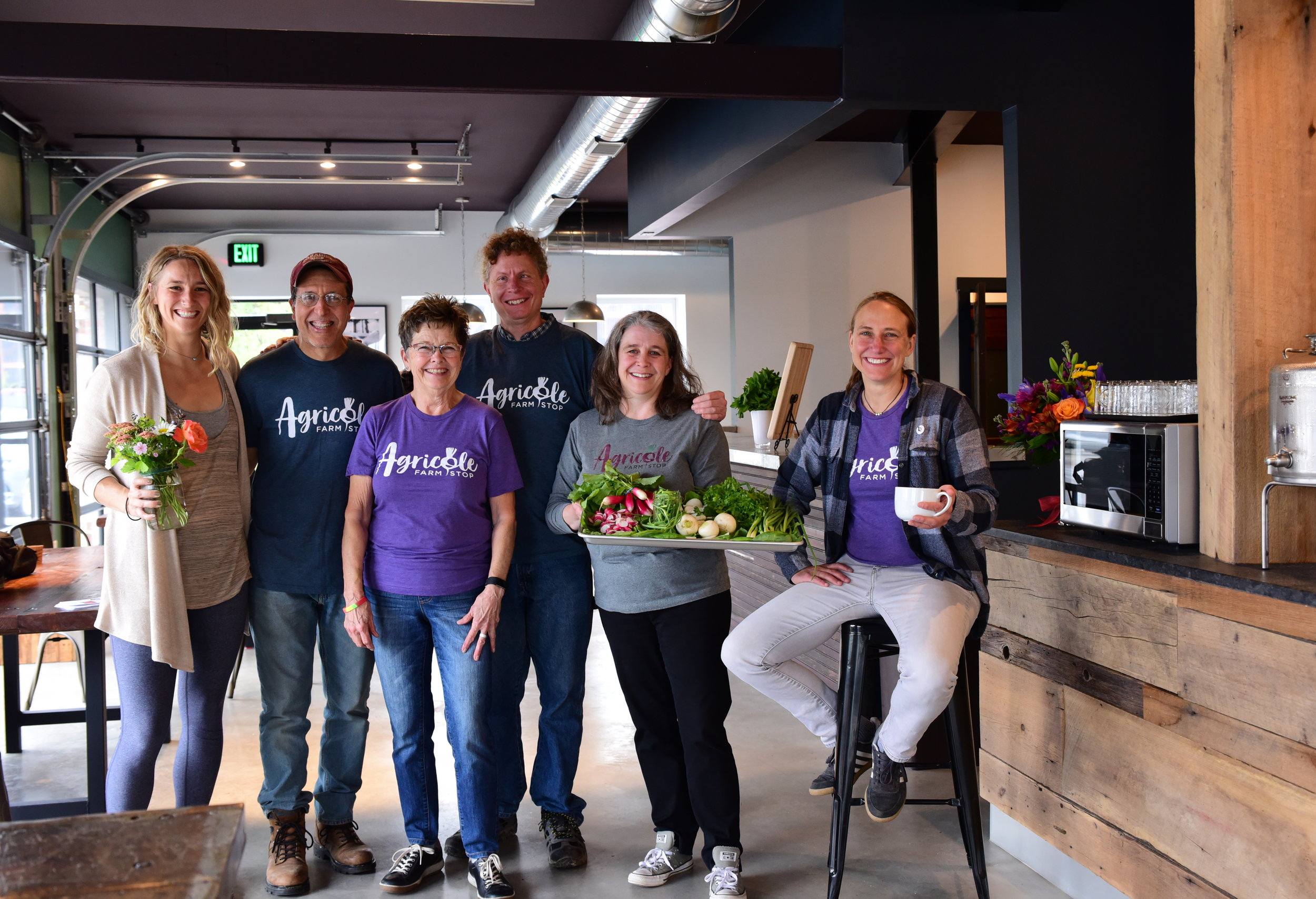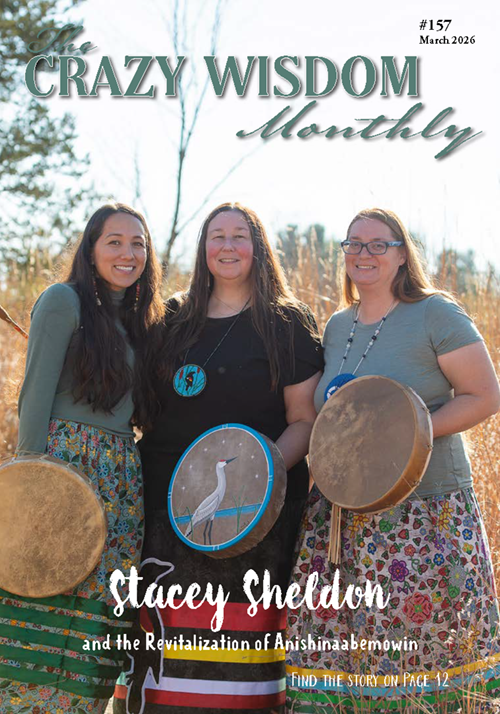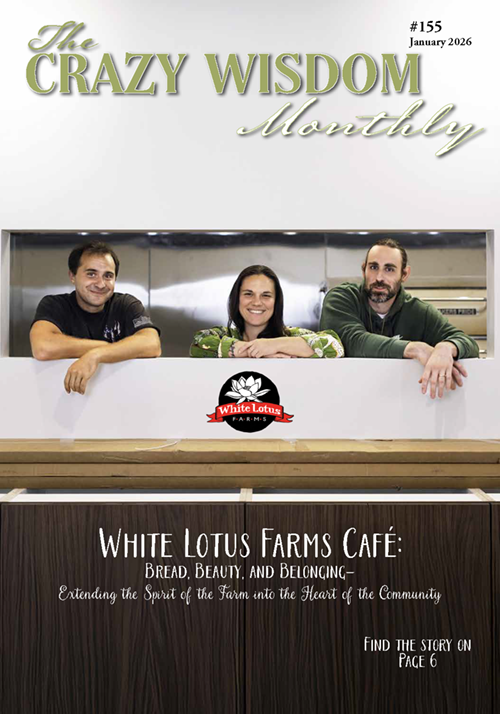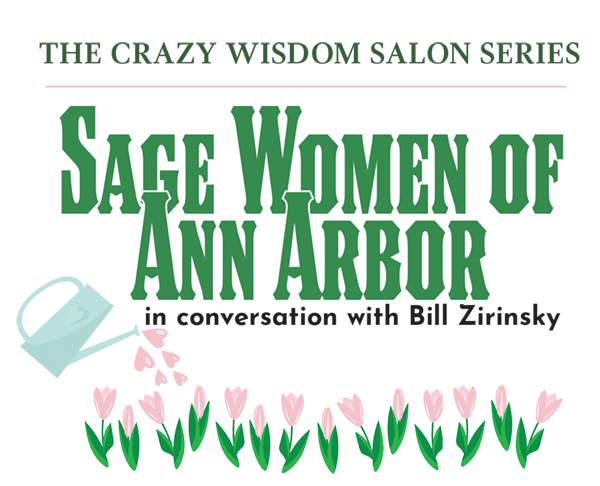By Angela Madaras
Agricole is a word we can easily recognize as something related to agriculture, but its new namesake is more than that. Agricole Farm Stop and Coffee Bar is about cultivating a culture of community through our connections to its people, soil, and local foods combined with a central meeting and trading place in the heart of historic downtown Chelsea. The grocery and coffee bar sits just off the railroad tracks across from the Jiffy Mix mill. Here is where the intersection of past and present food entrepreneurs remind us of our agricultural heritage and the responsibility we have moving forward to support this locally grown economy and community in a sustainable way.
The model the founders of Agricole are implementing is similar to Ann Arbor’s Argus Farm Stop, which opened in 2014. The owners of Argus, Kathy Sample and Bill Brinkenhoof, mentored Agricole’s team by sharing their business model, plans, financials, and concept. From that seeding, a sprout grew that blossomed into a space finding its roots in the historic Mack Building, which sat empty for many years prior to its restoration. As of early summer 2019 the building is home to the market, coffee bar, and a small wholesale bakery creating specialty shortbread cookies exclusively by order and available in the Agricole coffee bar.
All of the goods the market has to offer come from farmers and producers within a fifty-mile radius and supports the local economy by ensuring that seventy-five cents of every dollar goes directly to those producers and farmers. More of the money the farmers and producers earn will stay within the community, creating a circle of support for all community members. In addition, Agricole is a food destination for those traveling through our area. 14,000 thousand drivers pass by their location every day. That is a considerable amount of traffic for a small town!
The four equal working partners of Agricole, Patrick Zieske, Abby Hurst, Sharon Norton, and Kathy Kennedy, formed an L3C (Low-profit Limited Liability Corporation). An L3C is a mission driven way of financing and operating a business whereby owners can invest their own funds, while at the same time receive municipal grants and public donations. When forming an L3C business, there is a dual mission of serving a social purpose and for profit, with the social component of the mission explicitly elevated above profit. They were awarded a matching grant from MEDC (Michigan Economic Development Company) in partnership with a publicly funded campaign through the Patronicity online funding site. This online format allowed community members to offer private donations totaling over $50,000 which was then matched by a grant of $50,000 from MEDC. They are the first business in Michigan to use this combination of limited profit company model funded by the founders, private donations, and grants. However, this type of business model also means the owners receive less profit than a normal Corporate, Sole Proprietor, or LLC Model. I asked Patrick Zieske, the partner with 35 years experience in information technology and financial forecasting systems, why they landed on the L3C model, to which he replied:
As for the L3C model, I found it most valuable because it accurately blends the various motivations that we—and others—actually felt in establishing this enterprise. It makes a true statement of who we are. We don't have to choose between social good and profit. Both are valid when kept in good balance. People who have contributed to us in various ways are each doing it for their own reasons. Crowd funding donors gave us money with no expectation of return because they simply wanted to make real the vision of healthy, local food in the community, along with a pleasant social space. Equity investors want some financial return, but they wouldn't invest purely for that reason—they believe in the mission too. Some people want to volunteer in the store simply because they love it (although please note, we haven't yet decided how much we want to utilize volunteer workers). Some people simply want to support the farmers by supporting Agricole. This should be recognized as the true nature of any benevolent enterprise: to give back in multiple ways, in multiple forms of capital, only some of which are financial. It is most encouraging to see this concept becoming so well accepted with the MEDC and with individual donors and investors.
The project was a three-year planning collaboration. There are many people involved above and beyond who I mention in this article, all of who desired to revitalize the local food economy. The owners are extremely transparent and share openly their enthusiasm about this business model. In addition to their own initial investment, they decided to take zero profit or pay out from the business for at least five years while they donate their time. If profits exceed the projection, the partners envision recycling more money into the local economy by raising the farmers' share of the sales price. Their paid staff received free customer service training through "Zingtrain," a program created by Zingerman's Deli as a way to educate food service businesses on best practices, sales, and marketing. One can see Agricole’s benevolent passion toward co-creating a vibrant food-centric retail and community space for the greater Chelsea area.
In addition to the market, coffee bar, bakery, and an indoor-outdoor community area, there are four upstairs apartments in the Agricole building. This makes it a one-of-a-kind mixed-use development project in Chelsea. With free parking, and the building being within walking distance for many residents, its location lowers the carbon footprint for both farmer and customer. Currently there is an additional three hundred and fifty square foot kitchen and counter sales venue available for rent within the market for anyone interested in selling on-site prepared foods, or for an accelerator kitchen. Agricole’s vision is in creating a place where people commune, have meetings, and relax while eating local delights and sipping coffee, thus supporting local farmers and producers year round. This means that local producers have a place to sell their goods through the market making it more feasible to sustain their businesses in all seasons.
Farmers who grow berries in the summer can make jams or freeze them for sale during winter months. It also creates a viable outlet for “Grab-and Go” food items prepared in approved cottage industry kitchens, limited shelf beverages, dairy products, eggs, and more. The frozen food section offers meats and produce as well as specialty items, and of course locally made ice cream. Easily stored vegetables and fruits such as potatoes, garlic, onions, some greens, root vegetables, apples, winter squash, and the like are always on the shelves. They also mentioned the possibility of food carts, trucks, and pop-up events in the future as well as food-centric festivals and live music on their roadside outdoor patio and parking lot.
The owner’s vision is lofty, yet based on the solid footprint that Argus Farm Stop (which for five years has successfully operated at two locations in Ann Arbor) provided. Having mentors like Sample and Brinkenhoof has given the Agricole team the confidence and numbers to ensure this venture will be a success—not only for their own investment, but for the community as a whole. Owner Abby Hurst shared this about Agricole’s relationship with Argus:
Kathy and Bill continue to be hugely supportive, but only offer ideas or input when we ask. We spent three days with them in the fall in a workshop format and they shared all of their financial data, vendors, startup costs/process, and operational methodology. They have been very transparent and encouraging throughout the process.
I am endlessly curious about business mentorship and collaborative community development. So I reached out to Sample about Argus’ commitment to sharing their business model with others like Agricole, even though they may be seen as competition.
Angela Madaras: What inspired you to share your business plans and model with Agricole?
Kathy Sample: It has always been our plan to be open and to encourage others to try out our model, or variations of it. It is part of our mission of growing the local agricultural economy. We started Argus with the premise that any impact we have that helps local farms find a stronger foothold in the food economy is consistent with our mission. We feel that working creatively on this with everyone in this ecosystem will result in the strongest growth for local farms. We started with 40 farms and now sell for over 200!
Angela Madaras: Do you plan to continue mentoring the owners?
Kathy Sample: Yes, we do! We expect to learn from them, as well—they are a very committed, talented group and are asking good questions about why we have certain operational procedures. I expect they will help us improve ours!
Angela Madaras: Are you receiving inquiries from others who wish to duplicate this model in other areas, and if so where?
Kathy Sample: We are currently in discussions with 20 plus groups around the U.S. about our model. They are all in different stages, and we try to help them and be as open as we can about our operating model and what to expect. In fact, we have developed a three-day consulting model so that these groups can come and see how our business model really works. If you are in the Hudson Valley, visit Random Harvest, a group who visited and has a compelling operation already!
Angela Madaras: What is the best aspect of this business for you? What brings you the most joy?
Kathy Sample: The PEOPLE we work with—the farmers and the customers and staff are the best part of doing this.
I had tea with Sharon Norton and Abby Hurst, two of the four Agricole owners on a sun-drenched day at Argus Farm Stop’s greenhouse in spring 2019. We then began emailing and bringing in the voices of the other two owners, Patrick Zieske and Kathy Kennedy, who equally share the enthusiasm and passion for what they are creating. The people and spirits behind a business are important to note. This is the human factor that is so important in any community collaboration. We are in this way a family, sharing our dreams and visions of a sustainable society where we can live, eat, and create together in peace and perhaps joy. The community table so to speak.
Angela Madaras: How did each of you find your way to one another?
Abby Hurst: Each of us had individually been inspired by the first Argus store on Liberty in its opening year and began dreaming about replicating a market like this in Chelsea. Patrick worked with a group of people in Chelsea called Transition Town who formed a committee to explore the market concept starting in 2015. Sharon found her way to this group after originally considering a location west of Chelsea. Abby approached the group after her and her husband, Joe Ziolkowski, discussed creating a community oriented food space in the Mack Building in downtown Chelsea which was under plans for renovation. Kathy has had a lifelong dream to run a food co-op and found her way to this small team. After much deliberation and lengthy discussion on the business model, unique community assets, and challenges of small businesses in small towns, the group decided to band together to form the business collectively. It was a process of gaining trust in each other, knowing each other’s expectations, and having a shared commitment to the mission.
The process of flushing out the business model, creating an operating agreement, aligning stakeholders in the community, raising investment capital, writing grants, talking with local producers, naming the business, and designing the market layout has been an 18-month journey which has forged strong bonds and foundation for the future. We are deeply committed to becoming the best community market and local food resource we can be for Chelsea and surrounding communities.
Angela Madaras: Can you break down the various areas in which your expertise will come in handy running this business? Who will do what and why?
Patrick Zieske: First off there are some things that all of us are going to do. When it comes to operating the store, each of us will be doing shifts at the beginning, partly because each of us is bringing in a passion for local food and serving the community in a very hands-on way. My professional background is in the areas of computer technology and financial analysis, so I get stuck with the role of tech guy: point-of-sales systems, accounting, web site, back office, computer networking, payroll, and a lot of banking. It just happened that way, I didn’t really ask for it, but I see the opportunity to contribute the greatest value in these ways.
Other specializations have naturally fallen into place too. Abby Hurst has gravitated toward the physical build-out of the Agricole space in the building. Perhaps that has just a little bit to do with her husband who owns the overall building renovation project? Definitely it does. Abby also took the lead on the “crowdfunding campaign” which fit her prior experience running non-profit organizations. Now, she is playing a leading role in the hiring of staff.
Kathy Kennedy has been absorbed largely as the point person or liaison for producers. In some ways this is the fun stuff, but it can also be quite tedious keeping track of the status and following up with so many people. She probably didn’t think her role as Sylvan Township Clerk was a prelude to this, but it definitely has been. Farther ahead, she hopes to also bring in Double Up Food Bucks to make Agricole a more affordable option to people with low incomes, as she has done before with the Chelsea Farmers Market.
Sharon Norton has worked in sales for several years and hopes to bring this skill into the market. Customer service is at the top of her list so as to deliver our produce and products in the best way possible for our customers, all the while supporting our local farmers and producers.
Angela Madaras: Is there an overall spiritual and or ethical-humanitarian drive behind your values? How do your values shape your business model?
Patrick Zieske: It is multi-faceted. We believe, as Argus Farm Stop has stated succinctly, our future is local. We see ourselves as being an integral part of the movement toward local and sustainable agriculture. We are reclaiming the connection with the land, the farmer, and the food that we are putting into our mouths. It is hard to imagine a more intimate connection. You do not feel that connection at all in an ordinary grocery store model for the simple reason that the growing of the food is so remote from the consumer. At Agricole, we want people to feel it when they taste the food. We want people to be conscious that 75% of the sales go back to the farmer-producers—the same farmer who is labeled on the shelf and whom you might actually meet in person. We also want to enable people to make a conscious choice about health and nutritional properties of food, build a feeling of trust in the farmers, and grow a practice that is worth so much more than simply finding an organic labeled box. Finally, we hope to provide a social anchor point where people will build their own connections with each other! There is nothing quite like food or a morning coffee in a pleasant downtown atmosphere.
Angela Madaras: It is obvious each partner views the business as more than a way of creating income. You each have an enthusiastic passion for making our food system and community more sustainable. Was this always a passion or did something happen to grow this desire?
Kathy Kennedy: For me, this project is all about community. I have always been interested in grass roots movements and acting locally. I think it is the way we can have the greatest impact on our and our neighbor’s lives. When we realize we are all part of a functioning community, it fosters the caring and empathetic understanding so often missing in our contemporary world at large.
Patrick Zieske: I would say that my interest in sustainable food took some time to develop. Really, only in the past five to ten years has this been important to me. It is a combination of experiencing some of the problems are interrelated, and then finding the spark of inspiration that says, “Here, you can actually do something about it.” I moved to Chelsea ten years ago largely because I was attracted to the community that we have here. It is definitely worth reminding people who might otherwise take it for granted. This is indeed a special place, and it is an honor to be able to contribute to the future of our community.
Sharon Norton: The local food movement has been of real interest to me in the last ten years or so. I have seen the impact large corporate farming has had on the small farm and saw Agricole as a way to play a part in giving back to the local farmer.
Angela Madaras: As our political, ecological, social, and financial structures continue to fracture, what makes Agricole a possible solution for not just our Chelsea community, but other communities throughout Michigan and beyond? And do you see it as an exemplary model for other types of businesses outside the food-agriculture world? Or is this just a model for farm and food areas of interest?
Patrick Zieske: Buckminster Fuller said, “You never change things by fighting against the existing reality. To change something, build a new model that makes the old model obsolete." Well, sometimes you really DO need to fight it, but very often the fight starts with the struggle of the imagination to see beyond where we are now. That which is unsustainable will not be sustained, for sure. If you share a concern about our future and think it might have something to do with the fragmentation of our relationships—to each other in our communities, to our economies, to our sense of place, and our own bodies in the case of food—then perhaps you would like to see a model like Agricole take root. Argus Farm Stop has taken on a part of their mission to spread their business model—that is one reason why Agricole is here now. Every town that is agriculturally rich could have a store like this. Each time one succeeds, it has the potential to inspire more.
Kathy Kennedy: Our vision for Agricole supports community connections; with customers, farmers, and producers. The more we can come together as a community, the greater our chances of successfully working together. In fact, I believe interacting with each other at a community level is the antidote to the fracturing of our society. Whether it is having a community space for gathering, or a way to know your local farmers, we hope our store will help create deeper, more meaningful connections to each other.
Angela Madaras: How do you envision creating a food destination scene in Chelsea? And how do you measure if a community is ready for this? Have you polled citizens? I ask this because there have been efforts in the past which did not turn out well. Have you seen local community members' support aside from crowd funding and personal donations?
Sharon Norton: The Chelsea Community appears to be very supportive of our farm stop. I have been to several of the local businesses, and just talking to people in general, and have heard a great deal of excitement and eagerness for this store to open. I have no doubt that the surrounding communities will also support our endeavor. They are looking forward to local produce on a daily basis.
Angela Madaras: In a perfect world, what does Agricole and Chelsea look like five years down the road?
Abby Hurst: I see Agricole being a model for positive change and Chelsea being the destination point for others to witness this change—hopefully to emulate our model in other towns and cities.
Patrick Zieske: Agricole is going to be the hub of a vibrant Chelsea Community. We will know it is happening when people no longer feel like driving to Ann Arbor or Jackson to find their food. In an ideal world five years from now, Agricole’s space will not be large enough. There will need to be a couple more places like this in different parts of town.
Additionally, maybe we will have a commercial kitchen in the suite next door in the same building. Maybe an animal processing facility started by some people in the Chelsea area. These kinds of things will help increase local agricultural capacity and reduce the cost of operations for producers, ultimately bringing down the price point to customers too.
Angela Madaras: What do you want your customers and neighbors to know or understand about Agricole and its people?
Sharon Norton: I would hope that our customers would understand our mission to support the local farmers by giving directly to them via our market. We are dedicated to this mission.
Kathy Kennedy: By using the consignment model, we are giving back 75% of sales back to the farmer and producer. This is much greater than they get at other stores. Customers can feel good that they are supporting their neighbors and having a positive impact on their health and community’s health. Above all we are mission driven, and that mission focuses on growing our local food economy.
I have been involved in the area of mindful eating and shopping, in addition to growing, raising, and cooking food professionally for many years. I remember learning how to bake bread at the Wildflour Community Bakery, which is now Café Verde on Fourth Avenue in Ann Arbor. I was nineteen. The love of food, nutrition, health, wellness, and everything local-food began for me at that moment. The fact that I live between Chelsea and Ann Arbor is a true gift, one that will grow in depth with Agricole opening the doors wide open for others in this unique and fast growing business we call local food.
Visit Agricole at the corner of Main Street and Jackson Street in Chelsea, Michigan. They are open seven days a week. For more information give them a call at (734) 389-8880, visit them online at agricolefarmstop.com, or follow them on Facebook @agricolefarmstop.










































































































































































































Recipes for Moon Milk and Harvest Lentil and Wild Rice soup. Winter Issue #91